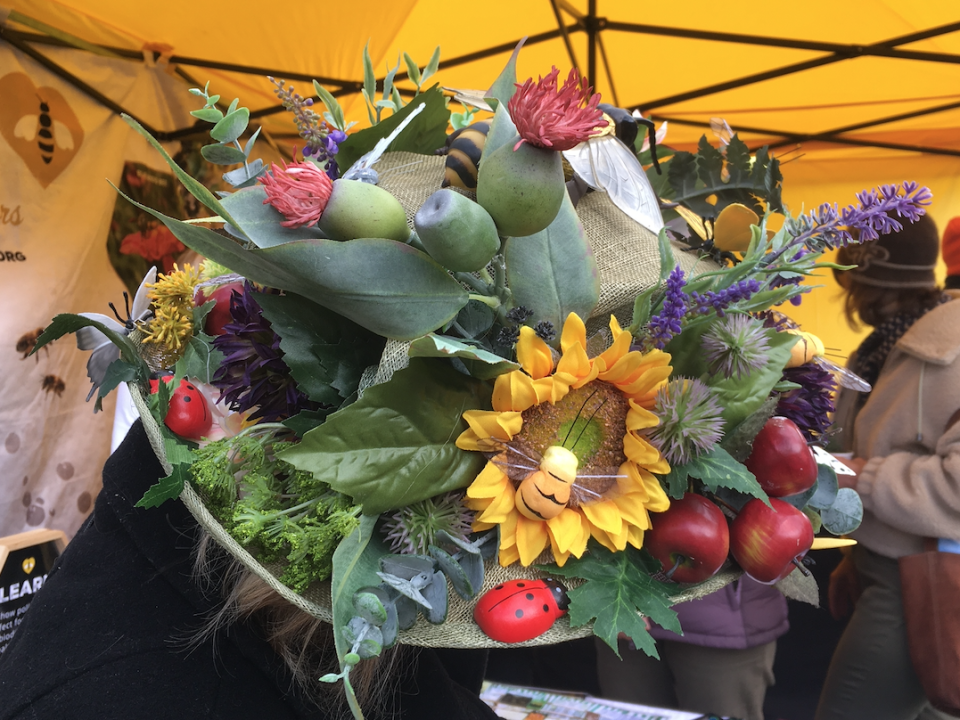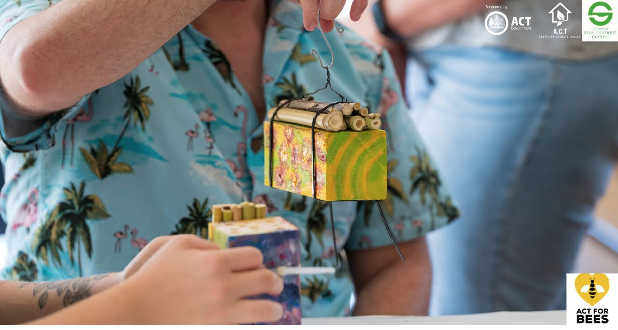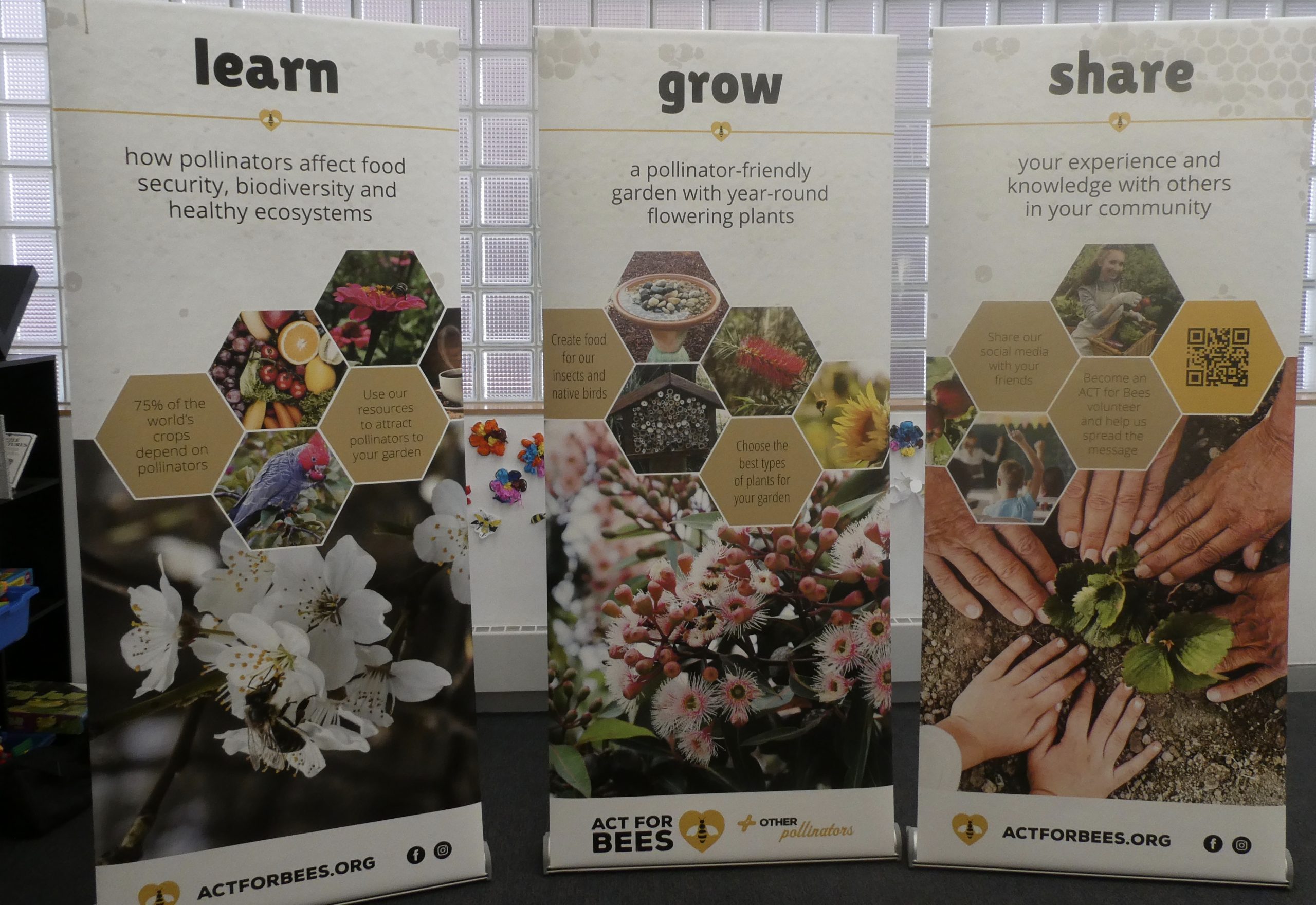
The Buzz About World Bee Day Celebrations 2022
May 17, 2022
Australian Pollinator Week 2022
May 2, 2023With Spring upon us, now is the time to start thinking about planting for pollinators. The wet winter and the forecast rain through summer means that there’s no better time to get plants into the ground! Download the ACT for Bees Planting Guide to create a delicious smorgasbord in your garden for hungry bees and other pollinators.
Please come see us at Floriade. We will be talking about Creating a Bee Friendly Garden along with the Canberra Environment Centre on Wednesday 21st Sept 11am & Thursday 13th October 12.30 pm. Book here. Check out the Floriade programme here.
Rotarians for Bees (Victoria) are working to expand their wonderful Planting for Pollinators initiative into NSW and the ACT. We are supporting them by sharing our PowerPoint presentation about the importance of pollinators for food security, biodiversity and healthy ecosystems which includes wide range of planting guides and educational resources. More on this exciting development in coming months. If you belong to a Rotary Club, please let us know if you would like to join in and if you would like us to present to your community organisation.
The recent release of the State of the Environment Report by the Federal Government has identified the key factors which are threatening biodiversity across Australia and impacting on our quality of life. Whilst many of the statistics in the report point to very serious environmental threats, the report also identifies key areas where community, government and business can work together. According to the report, Australia’s cities and towns are home to more than 96% of our population and 46% of our threatened species. For ideas about what you can do in your backyard or what you can do in the community, read the Conversation article here.

We recently met with ACT Minister Rebecca Vassarotti to discuss our Strategic Plan 2022-2025 and ways we can continue our collaborations with the ACT Government. Introducing pollinator and wildlife friendly plantings in our gardens and communities help to complement larger scale ecological connectivity work, so important in this time of biodiversity loss. We very much appreciated hearing about the many ways the ACT Government is prioritising plantings including the Urban Forest Strategy, the Living Infrastructure Plan, Cooling the City Strategy. We are also involved in the ACT Food and Fibre Strategy.
Upcoming Events
Saturday September 17th 9am-3pm
Tuggeranong SpringFEST Sustainability Fair will introduce you to some exciting new ways to reduce your environmental footprint, plus connect with others in your community! Stalls and workshops.
Wednesday 21st Sept 11am & Thursday 13th October 12.30 pm.
Floriade -‘Creating a Bee Friendly Garden’ with the Canberra Environment Centre Book here.
Check out the Floriade programme here.
Sat 5th November 10am – 4pm
Canberra Organic Growers Kambah Open DaySaturday 12th – 20th November – The Big Annual Event!
Australian Pollinator Week – Let’s celebrate our local pollinators! Look out for events and create your own. Please use our free Love Food? Love Bees! curriculum and contact us if you would like ideas and support.

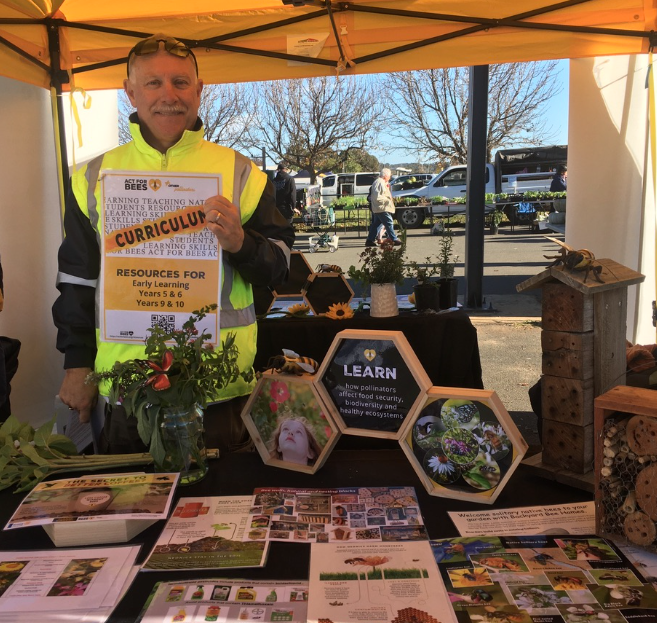
The recent discovery of the varroa mite in New South Wales is of great concern and highlights the dependency the Australian agricultural industry has on honey bees. Dr Judy Friedlander of Planting Seeds, points to the need for biodiversity in our pollinator populations, including the many species of native bee to ensure food security. (The varroa mite does not affect native bees.) She notes the success of native blue banded bees in the greenhouse tomato industry as well as promising developments in the macadamia industry with Tetragonula carbonaria, more commonly known as the sugarbag bee.[1]
Our Planting Guide includes specific recommendations for additions to your garden which will provide pollen and nectar for native bees endemic to the Canberra region.
1] https://www.ps.org.au/content/articles/2022/7/1/native-bees-flying-high-in-latest-biosecurity-emergency
Some Interesting Books to Read![]() Wilding: The roamed Britain the 3,500 acre project has seen extraordinary increases in wildlife Return of Nature to a British Farm by Isabella Tree. Forced to accept that intensive farming on the heavy clay of their land at Knepp, West Sussex was economically unsustainable, Isabella Tree and her husband Charlie Burrell made a spectacular leap of faith: they decided to step back and let nature take over. Thanks to the introduction of free-roaming cattle, ponies, pigs and deer proxies of the large animals that once numbers and diversity in little over a decade. Part gripping memoir, part fascinating account of the ecology of the English countryside, Wilding is, above all, an inspiring story of hope.
Wilding: The roamed Britain the 3,500 acre project has seen extraordinary increases in wildlife Return of Nature to a British Farm by Isabella Tree. Forced to accept that intensive farming on the heavy clay of their land at Knepp, West Sussex was economically unsustainable, Isabella Tree and her husband Charlie Burrell made a spectacular leap of faith: they decided to step back and let nature take over. Thanks to the introduction of free-roaming cattle, ponies, pigs and deer proxies of the large animals that once numbers and diversity in little over a decade. Part gripping memoir, part fascinating account of the ecology of the English countryside, Wilding is, above all, an inspiring story of hope.
Humanity’s Moment: A Climate Scientist’s Case for Hope, by Joëlle Gergis. As one of the Intergovernmental Panel on Climate Change (IPCC) authors, Joëlle Gergis takes us through the science in the IPCC report with unflinching honesty, explaining what it means for our future, while sharing her personal reflections on bearing witness to the heartbreak of the climate emergency unfolding in real time. But this is not a lament for a lost world. This book is a climate scientist’s guide to rekindling hope, and a call to action to restore our relationship with ourselves, each other and our planet.
![]() The Age of Seeds: How Plants Hacked Time and Why our Future Depends on It, by Fiona McMillan-Webster. Plants evolved seeds to hack time. Thanks to seeds they can cast their genes forward into the future, enabling species to endure across seasons, years, and occasionally millennia. Yet many seeds, including those crucial to our everyday lives, don’t live very long at all. In The Age of Seeds Fiona McMillan-Webster tells the astonishing story of seed longevity, the crucial role they play in our everyday lives, and what that might mean for our future.
The Age of Seeds: How Plants Hacked Time and Why our Future Depends on It, by Fiona McMillan-Webster. Plants evolved seeds to hack time. Thanks to seeds they can cast their genes forward into the future, enabling species to endure across seasons, years, and occasionally millennia. Yet many seeds, including those crucial to our everyday lives, don’t live very long at all. In The Age of Seeds Fiona McMillan-Webster tells the astonishing story of seed longevity, the crucial role they play in our everyday lives, and what that might mean for our future.
Around the World in 80 Plants, by Jonathan Drori with Illustrations by Lucille Clerc. In his follow-up to the bestselling Around the World in 80 Trees, Jonathan Drori takes another trip across the globe, bringing to life the science of plants by revealing how their worlds are intricately entwined with our own history, culture and folklore. Each of these stories is full of surprises. Some have a troubling past, while others have ignited human creativity or enabled whole civilizations to flourish. There are parasites and carnivores and even plants that destroy telephone wires.
Some interesting websites and links
This is a wonderful post about butterflies in the Canberra region and further beyond. Amazing pictures. Butterflies are Suckers!
The complex interactions between plant communities and pollinators are highlighted in a number of research studies, including one which found that as plants compete for a declining population of visiting pollinators, they experience population decline and an overall decrease in species diversity. This could have implications for food security, particularly as global populations increase. Other studies suggest that food systems in high-income countries benefit tremendously from the stability of pollination services in lower-income countries. Explore further in these links.
Less Variety: fewer pollinators lead to lower plant diversity
Plain language summary: The interconnected web of people, crops and wild species
Globalisation and pollinators: Pollinator declines are an economic threat to global food systems
Fancy some honey bee fencing to keep out the wallabies? In some parts of the world honey bee fences are keeping elephants out!
Living ‘Bee Fences’ Protect Farmers from Elephants, and Vice Versa
Honey Fencing and Bee Farming Project
This very comprehensive report on the decline in global insect populations makes sobering reading. Monga Bay Pollinator News
But there’s some good news too with the world’s largest bee found (again) in Indonesia. World’s largest bee, missing for 38 years, found alive in Indonesia
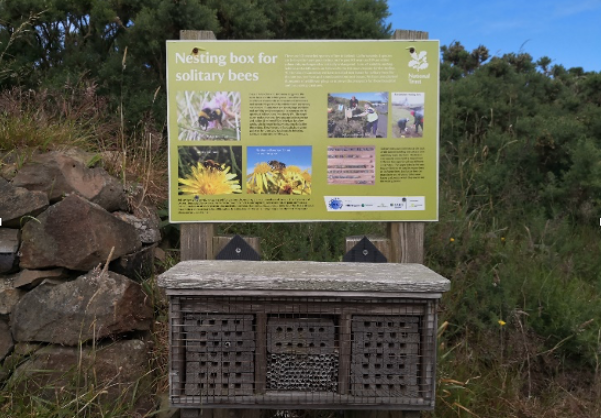
We hope that you will support us by planting for pollinators in your garden or balcony and please come along to one of our events.
Learn how pollinators affect food security, biodiversity and healthy ecosystems!
Grow a pollinator friendly garden with year round flowering plants !
Share your experience and knowledge with others in your community.
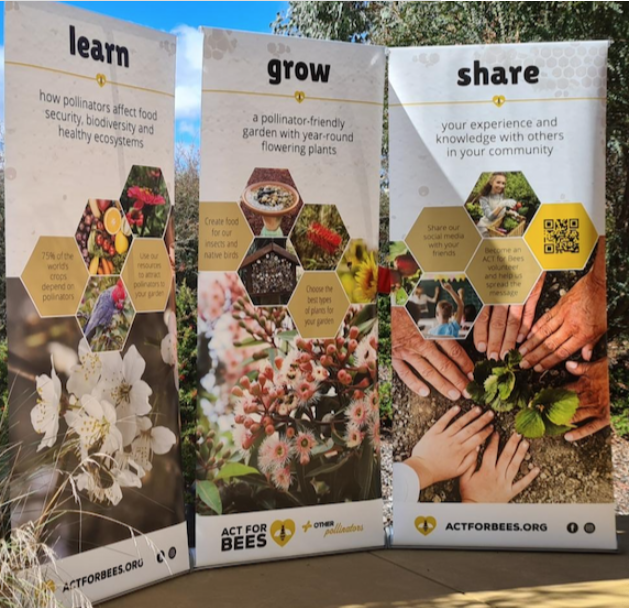
Julie, Lynne, Didi, Cormac, John, Meredith, Vicki, Mark, Steven, Zoe, Rhonda, Robert, Mayra and Mark,
the ACT for Bees team.
Like to join us? We’re seeking volunteers to help us out with ACT for Bees growing activities including events and presentations! On-job training provided!
Please contact us.



